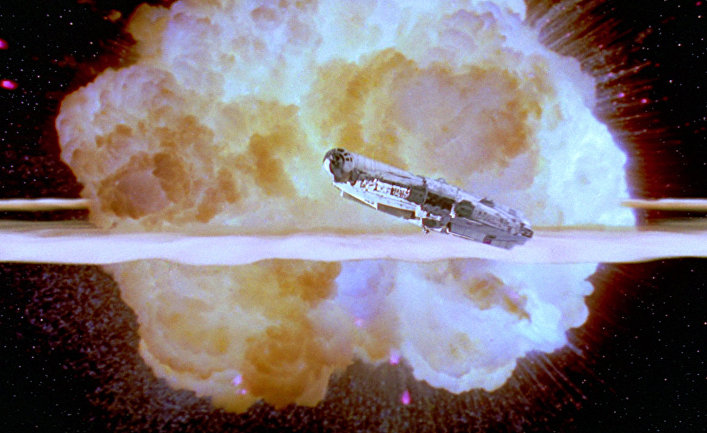
As will be war in space? Given the primitive state of our space technology, we hardly can imagine what kind of weapon it will be used. But let’s put aside our fantasies about plasma bombs and “death Stars”, take a step back and think about strategy, that is, about the causes of conflict and its General outline. The basic principles of the strategy have not changed since then, as roamed the forests monkeys, goading his enemies and slowly tiring out the pack of his enemies. We have every reason to believe that the same principles will apply, and in extraterrestrial war.
The possibility of interstellar wars is not only interested in science fiction writers looking for new storylines, but astronomers who are puzzled why we have not yet found any signs of extraterrestrial life. This is a very disappointing answer: perhaps we are not unique in our galaxy is full of war threats. Aggressive species could destroy each other with nuclear weapons, and the rest, fearing devastating attacks, could lay low and not stick out. Some scholars argue that we would do well to keep a prudent silence, so as not to experience the war of the worlds in real life. But there are others who think a war with aliens is unlikely, and believes that space battles people are likely to keep each other.
Author of articles and a graduate student at the Finnish Aalto University Janne Korhonen (Korhonen Janne) is one of the few theorists of the interstellar wars (Yes, there are). In 2013 he wrote that the aliens, even significantly surpassing us in engineering and technology, are unlikely to attack humans. For starters, why would they do that? Wars are usually over resources. About a hundred years ago, historian John Edwin Bakeless (John Edwin Bakeless) has estimated that 14 of the 20 wars that were fought from 1878 to 1918, had economic reasons, and were closely associated with the establishment of control over natural resources. This number will be even greater if we include the aggressive colonial war that could be considered a struggle for resources.
But if the aliens need resources, then an attack on Earth does not make much sense, since gas giants and asteroids are huge reserves of materials which can be used indefinitely and absolutely free. Of course, the Earth has the greatest diversity of materials in the solar system due to the impact of life and water; but to get to our solar system, you will need a huge amount of fuel, causing the whole thing will be meaningless from the point of view of cost-benefit. Such a voyage can be solved only one alien species, which need our specific minerals (or who need food in the form of intelligent beings on a carbon basis).
However, if aliens do decide to war with us, they will face enormous risks. Korhonen argues that if the aliens are not a hundred percent confident in your ability to destroy us, they will not be confident in the final victory over us. They often say that advanced aliens look at us as ants — and those who have ants in the house or in the yard, knows that destroying them is almost impossible. Even if you survive the unit, they will quickly reproduce and colonize again planet, but at the same time get acquainted with the technology of the aggressor and prepare a retaliatory strike. Meanwhile, who witnessed such aggression by the neighboring civilizations can engage in this war, at least for the sake of protecting their own interests. In light of these strategic calculations of an invasion from aliens is absolute nonsense.
In science fiction we usually focus on war between aliens and humans. But when it comes to real star wars, think we’ll have about the alien species and our own. When we and our robotic descendants will begin to settle across the solar system, the Earth will be its capital or center of concentration of power and authority, as this place of our origin — and the largest solid planet. But on Mars, Ceres and other colonized celestial bodies will eventually occur its own economic and political systems. Just look at our own history, and we understand that the pursuit of alien colonies to sovereignty may well be able to lead to war, as disputes over resources.
The Prussian military theorist of the 19th century, Carl von Clausewitz argued that in war there are three main strategies: annihilation, inflicting casualties and wearing down. Science fiction tend to prefer the destruction in one decisive battle, where one side destroys the military power of the enemy. But history shows that two other strategies are much more, and that would guide commanders interplanetary war. The application of losses implies a gradual weakening of the military forces of the enemy and wearing down usually means the weakening of the industrial power and willpower of the population. In a space war to conduct all-out attack would be difficult because of vast distances and energy costs. The enemy will be able to cut off supply routes, to bomb cargo ships and block the radio. One of the parties can refuse to fight, even if it is not defeated, because the costs will be unacceptably high.
Professor of astrobiology at the University of Edinburgh Charles Cockell (Charles Cockell) in his essay for the Symposium entitled “Dissent, revolution and freedom beyond the Earth” argues that we can achieve interplanetary peace on the same principle that prevented a third world war: mutually assured destruction. The space environment is extremely fragile, and if you punch a hole in an air-tight dome alien colonies, it will be enough to destroy thousands of people. While Mars will not be completely terraformation (that is, brought into a state fit for human habitation, earth’s animals and plants), all there are the colonies will be too unstable to start a war. And asteroids and satellites of the outer planets will always be extremely vulnerable.
The Earth also has vulnerabilities, what in my previous work was written by Ian Crawford (Ian Crawford) of the University of London and Stephen Baxter (Stephen Baxter) from the British interplanetary society. The force of gravity on Earth stronger than her rival worlds, and therefore released the meteorites will fly with acceleration and cause enormous damage. Thus, the costs of war in space from all sides outweigh the benefits from it.
Maybe in space we can achieve the peace that so often eludes us on Earth.







